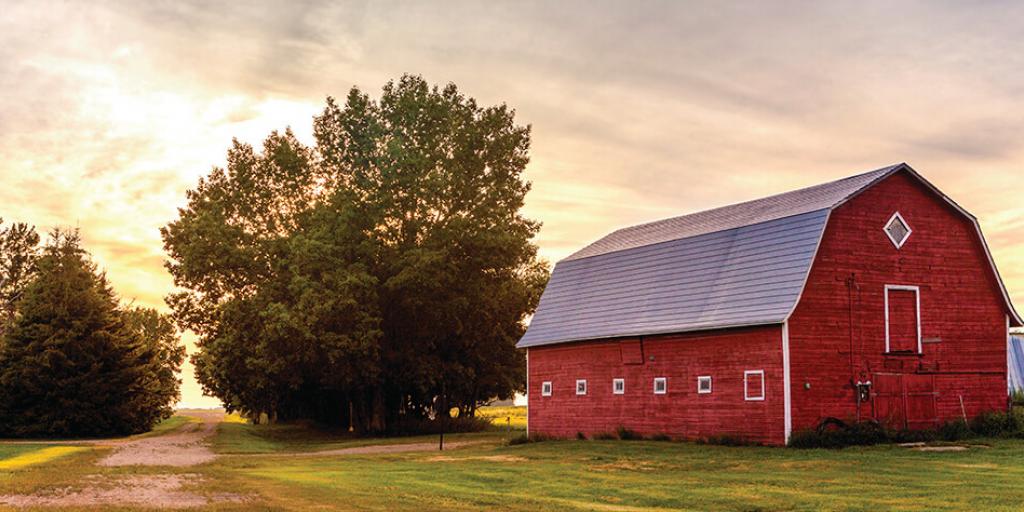
Lo the Barn...
Times change and one generation’s meaningful metaphors are lost on the next. In an urban age of dizzying technological advances, Internet access, and an endless array of devices, earthy agricultural references lose their impact. This is lamentable since life lessons are prominently symbolized by agrarian practices in the Bible. Many colorful expressions and illustrations picture prosperity on one hand and deprivation on the other, offering spiritual lessons to be learned from each.
Scripture often refers to the barn—the time-worn shelter for produce and livestock. Now, if someone has spent time around a barn as a child, the mention of one probably brings back a flood of memories. The sights, sounds, and smells of a barn are unique to rural life. The play of light and shadows in the building fascinated me as a child. There were stalls for livestock such as milk cows, goats, or newborn foals. Horses and mules had their places for being fed and sheltered. The loft usually contained hay and animal feed for the winter, along with other produce of the harvest. The work animals seemed to look forward to returning to the barn at the end of the day for rest and feed. A good, well-stocked barn can serve as a metaphor for peace, prosperity, and shelter. Someone who has never been in or around a barn may have a hard time grasping the significance of this farm building.
In describing the benefits of obeying God’s Commandments, Moses was inspired to write, “The Lord will command the blessing upon you in your barns, and in all that you undertake; he will bless you in the land that the Lord your God is giving you” (Deuteronomy 28:8, New Revised Standard Version). Proverbs, the “Book of Wisdom,” contains this gem: “Honor the Lord with your possessions, and with the firstfruits of all your increase; so your barns will be filled with plenty…” (Proverbs 3:9–10).
As King David prayed for Israel’s national deliverance and security, he included this request: “May our barns be filled, with produce of every kind…” (Psalm 144:13 NRSV).
Jesus Christ gave timeless instructions for keeping physical things in perspective: “Therefore I say to you, do not worry about your life, what you will eat or what you will drink; nor about your body, what you will put on. Is not life more than food and the body more than clothing? Look at the birds of the air, for they neither sow nor reap nor gather into barns; yet your heavenly Father feeds them. Are you not of more value than they? … But seek first the kingdom of God and His righteousness, and all these things shall be added to you” (Matthew 6:25–26, 33). His emphasis was on putting the spiritual first.
To further illustrate His point, Jesus told the story of a rich man whose priorities were askew. “The ground of a certain rich man yielded plentifully. And he thought within himself, saying, ‘What shall I do, since I have no room to store my crops?’ So he said, ‘I will do this: I will pull down my barns and build greater, and there I will store all my crops and my goods. And I will say to my soul, “Soul, you have many goods laid up for many years; take your ease; eat, drink, and be merry.”’ But God said to him, ‘Fool! This night your soul will be required of you; then whose will those things be which you have provided?’ So is he who lays up treasure for himself, and is not rich toward God’” (Luke 12:16–21).
As mankind persists in ignoring the Commandments of God, disaster will eventually come. In about 836 B.C. the prophet Joel wrote about the dreadful Day of the Lord. “Alas for the day! For the day of the Lord is at hand; it shall come as destruction from the Almighty. Is not the food cut off before our eyes, joy and gladness from the house of our God? The seed shrivels under the clods, storehouses are in shambles; barns are broken down, for the grain has withered. How the animals groan! The herds of cattle are restless, because they have no pasture; even the flocks of sheep suffer punishment” (Joel 1:15–18).
So, when you see a barn, recognize that though it is a structure that holds physical blessings, those blessings are of no lasting value if one’s purpose in life is not seeking first the Kingdom of God and His righteousness.
Whether we have barns or not, it is important for all of us to keep our possessions in the proper perspective. The television programs, magazine, booklets, and Bible Study Course produced by Tomorrow’s World are dedicated to helping people do just that. These vital materials are available free of charge at TomorrowsWorld.org.
Stay up to date with our Weekly Digest Email!
Tomorrow's World ComMentary Podcast
Subscribe to Tomorrow's World Commentary podcasts on iTunes and Google Play!



